Analysis of Leadership, Management, and Operations at Tesco (BUS101)
VerifiedAdded on 2021/02/20
|15
|4287
|125
Report
AI Summary
This report provides a comprehensive analysis of leadership and management practices at Tesco, a multinational grocery retailer. It examines the distinct roles and characteristics of leaders and managers, differentiating their functions within the organization. The report explores the application of leadership and management in various situational contexts, including task allocation, labor turnover, and productivity challenges. It critically analyzes and evaluates different leadership theories, such as situational, system, and contingency theories, assessing their strengths and weaknesses. The study further investigates key approaches to operations management, highlighting the roles of leaders and managers in increasing operational efficiencies and achieving business objectives. Finally, the report assesses the impact of external factors on decision-making and operational management within Tesco, concluding with a synthesis of the findings and implications for effective leadership and management.
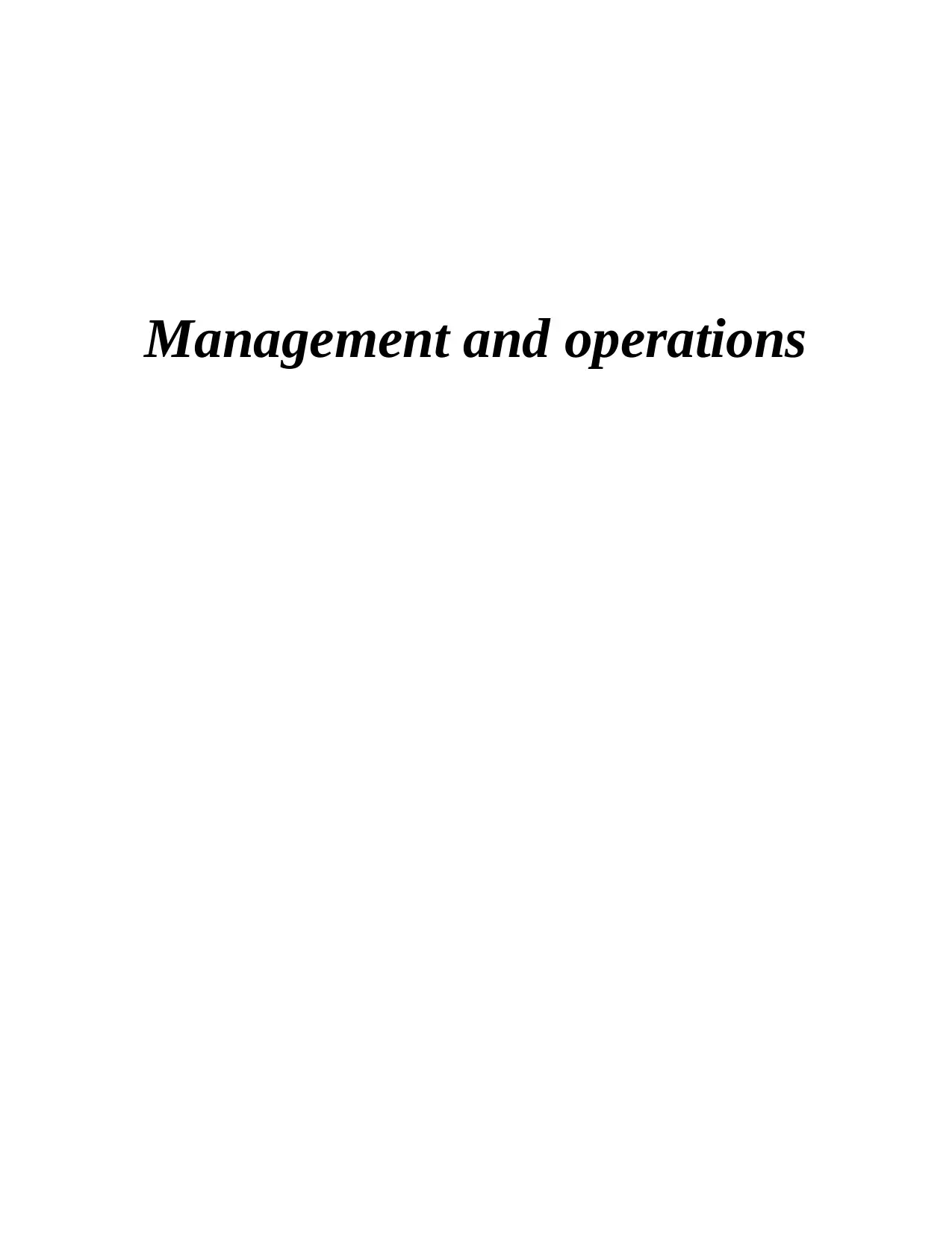
Management and operations
Paraphrase This Document
Need a fresh take? Get an instant paraphrase of this document with our AI Paraphraser
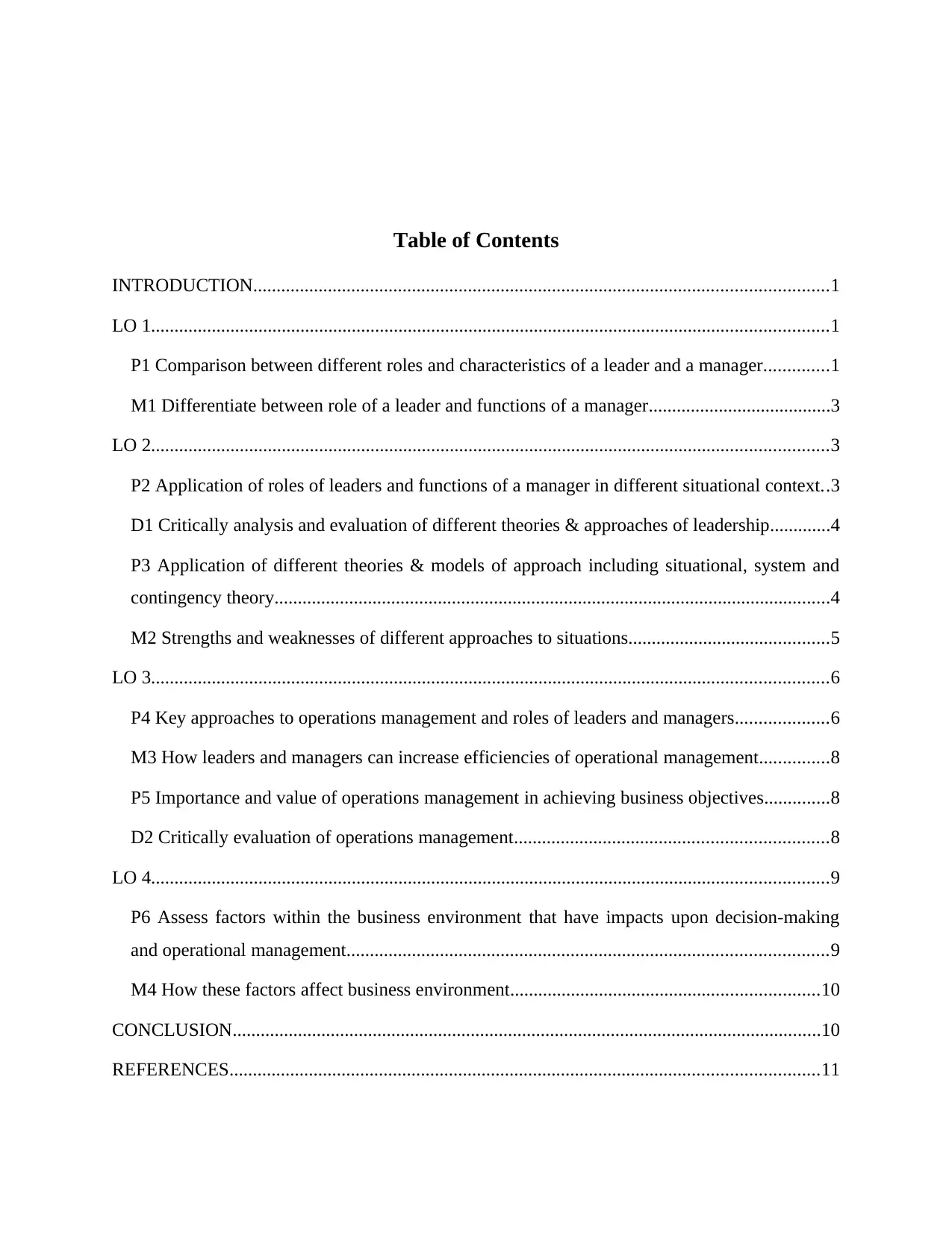
Table of Contents
INTRODUCTION...........................................................................................................................1
LO 1.................................................................................................................................................1
P1 Comparison between different roles and characteristics of a leader and a manager..............1
M1 Differentiate between role of a leader and functions of a manager.......................................3
LO 2.................................................................................................................................................3
P2 Application of roles of leaders and functions of a manager in different situational context..3
D1 Critically analysis and evaluation of different theories & approaches of leadership.............4
P3 Application of different theories & models of approach including situational, system and
contingency theory.......................................................................................................................4
M2 Strengths and weaknesses of different approaches to situations...........................................5
LO 3.................................................................................................................................................6
P4 Key approaches to operations management and roles of leaders and managers....................6
M3 How leaders and managers can increase efficiencies of operational management...............8
P5 Importance and value of operations management in achieving business objectives..............8
D2 Critically evaluation of operations management...................................................................8
LO 4.................................................................................................................................................9
P6 Assess factors within the business environment that have impacts upon decision-making
and operational management.......................................................................................................9
M4 How these factors affect business environment..................................................................10
CONCLUSION..............................................................................................................................10
REFERENCES..............................................................................................................................11
INTRODUCTION...........................................................................................................................1
LO 1.................................................................................................................................................1
P1 Comparison between different roles and characteristics of a leader and a manager..............1
M1 Differentiate between role of a leader and functions of a manager.......................................3
LO 2.................................................................................................................................................3
P2 Application of roles of leaders and functions of a manager in different situational context..3
D1 Critically analysis and evaluation of different theories & approaches of leadership.............4
P3 Application of different theories & models of approach including situational, system and
contingency theory.......................................................................................................................4
M2 Strengths and weaknesses of different approaches to situations...........................................5
LO 3.................................................................................................................................................6
P4 Key approaches to operations management and roles of leaders and managers....................6
M3 How leaders and managers can increase efficiencies of operational management...............8
P5 Importance and value of operations management in achieving business objectives..............8
D2 Critically evaluation of operations management...................................................................8
LO 4.................................................................................................................................................9
P6 Assess factors within the business environment that have impacts upon decision-making
and operational management.......................................................................................................9
M4 How these factors affect business environment..................................................................10
CONCLUSION..............................................................................................................................10
REFERENCES..............................................................................................................................11

⊘ This is a preview!⊘
Do you want full access?
Subscribe today to unlock all pages.

Trusted by 1+ million students worldwide
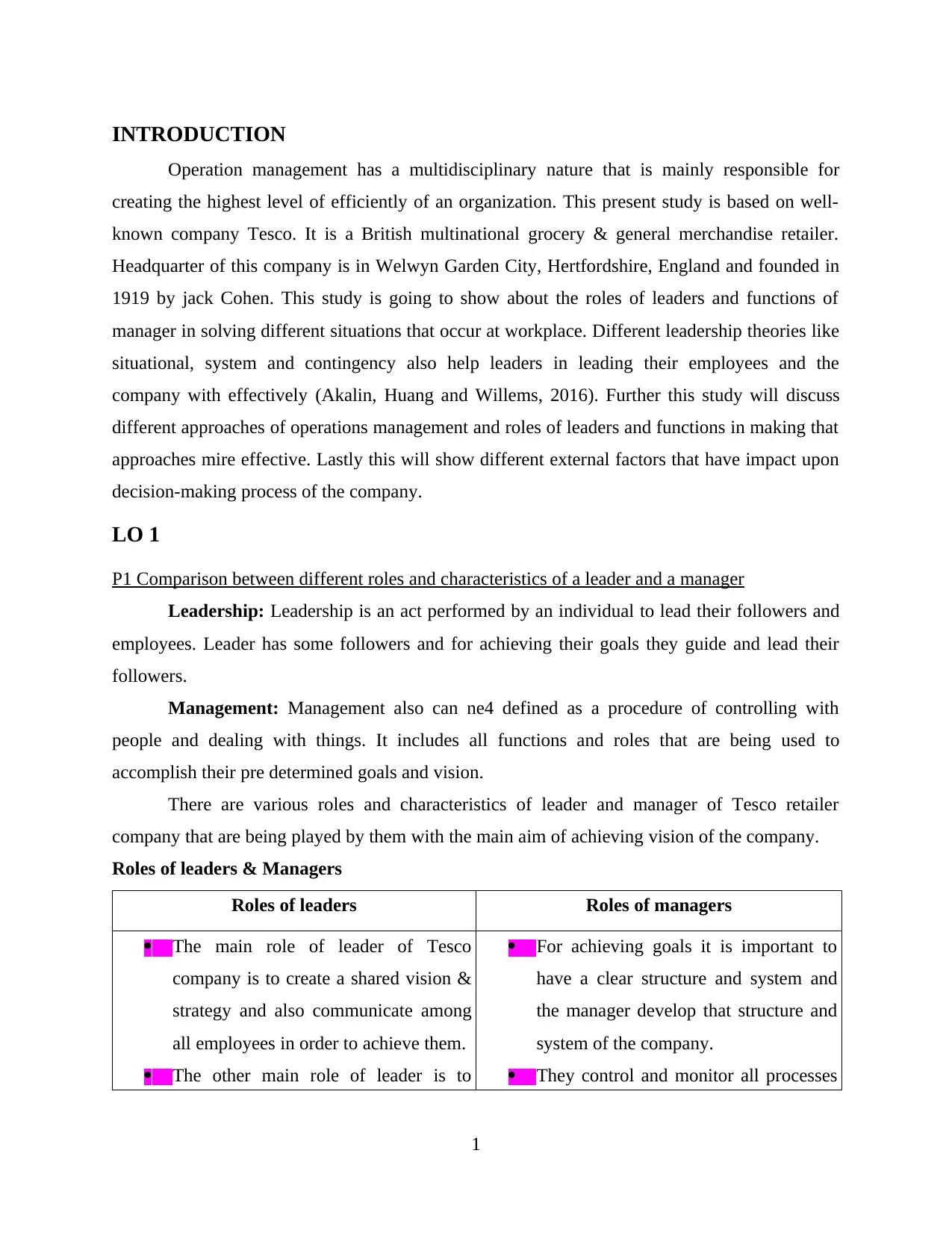
INTRODUCTION
Operation management has a multidisciplinary nature that is mainly responsible for
creating the highest level of efficiently of an organization. This present study is based on well-
known company Tesco. It is a British multinational grocery & general merchandise retailer.
Headquarter of this company is in Welwyn Garden City, Hertfordshire, England and founded in
1919 by jack Cohen. This study is going to show about the roles of leaders and functions of
manager in solving different situations that occur at workplace. Different leadership theories like
situational, system and contingency also help leaders in leading their employees and the
company with effectively (Akalin, Huang and Willems, 2016). Further this study will discuss
different approaches of operations management and roles of leaders and functions in making that
approaches mire effective. Lastly this will show different external factors that have impact upon
decision-making process of the company.
LO 1
P1 Comparison between different roles and characteristics of a leader and a manager
Leadership: Leadership is an act performed by an individual to lead their followers and
employees. Leader has some followers and for achieving their goals they guide and lead their
followers.
Management: Management also can ne4 defined as a procedure of controlling with
people and dealing with things. It includes all functions and roles that are being used to
accomplish their pre determined goals and vision.
There are various roles and characteristics of leader and manager of Tesco retailer
company that are being played by them with the main aim of achieving vision of the company.
Roles of leaders & Managers
Roles of leaders Roles of managers
The main role of leader of Tesco
company is to create a shared vision &
strategy and also communicate among
all employees in order to achieve them.
The other main role of leader is to
For achieving goals it is important to
have a clear structure and system and
the manager develop that structure and
system of the company.
They control and monitor all processes
1
Operation management has a multidisciplinary nature that is mainly responsible for
creating the highest level of efficiently of an organization. This present study is based on well-
known company Tesco. It is a British multinational grocery & general merchandise retailer.
Headquarter of this company is in Welwyn Garden City, Hertfordshire, England and founded in
1919 by jack Cohen. This study is going to show about the roles of leaders and functions of
manager in solving different situations that occur at workplace. Different leadership theories like
situational, system and contingency also help leaders in leading their employees and the
company with effectively (Akalin, Huang and Willems, 2016). Further this study will discuss
different approaches of operations management and roles of leaders and functions in making that
approaches mire effective. Lastly this will show different external factors that have impact upon
decision-making process of the company.
LO 1
P1 Comparison between different roles and characteristics of a leader and a manager
Leadership: Leadership is an act performed by an individual to lead their followers and
employees. Leader has some followers and for achieving their goals they guide and lead their
followers.
Management: Management also can ne4 defined as a procedure of controlling with
people and dealing with things. It includes all functions and roles that are being used to
accomplish their pre determined goals and vision.
There are various roles and characteristics of leader and manager of Tesco retailer
company that are being played by them with the main aim of achieving vision of the company.
Roles of leaders & Managers
Roles of leaders Roles of managers
The main role of leader of Tesco
company is to create a shared vision &
strategy and also communicate among
all employees in order to achieve them.
The other main role of leader is to
For achieving goals it is important to
have a clear structure and system and
the manager develop that structure and
system of the company.
They control and monitor all processes
1
Paraphrase This Document
Need a fresh take? Get an instant paraphrase of this document with our AI Paraphraser
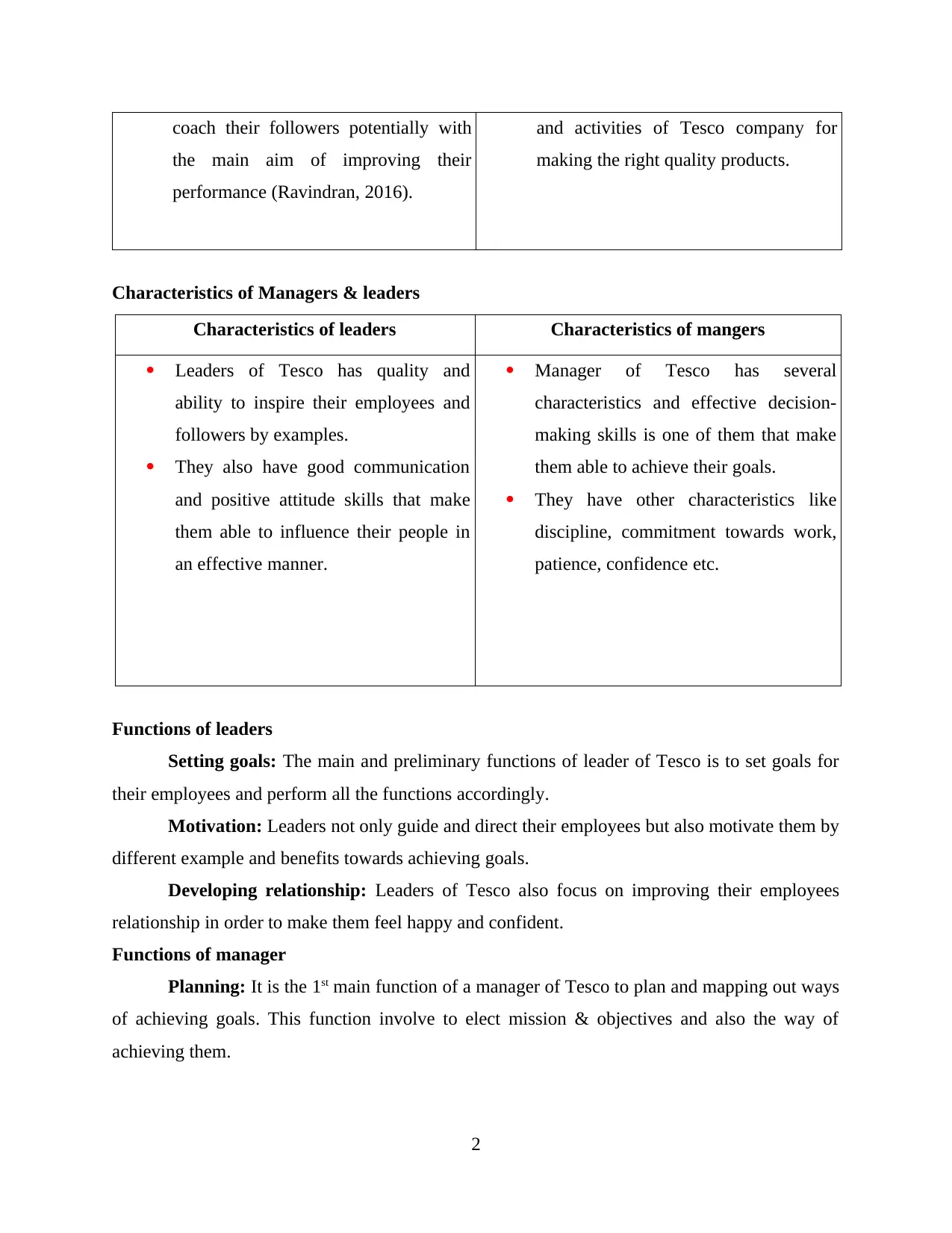
coach their followers potentially with
the main aim of improving their
performance (Ravindran, 2016).
and activities of Tesco company for
making the right quality products.
Characteristics of Managers & leaders
Characteristics of leaders Characteristics of mangers
Leaders of Tesco has quality and
ability to inspire their employees and
followers by examples.
They also have good communication
and positive attitude skills that make
them able to influence their people in
an effective manner.
Manager of Tesco has several
characteristics and effective decision-
making skills is one of them that make
them able to achieve their goals.
They have other characteristics like
discipline, commitment towards work,
patience, confidence etc.
Functions of leaders
Setting goals: The main and preliminary functions of leader of Tesco is to set goals for
their employees and perform all the functions accordingly.
Motivation: Leaders not only guide and direct their employees but also motivate them by
different example and benefits towards achieving goals.
Developing relationship: Leaders of Tesco also focus on improving their employees
relationship in order to make them feel happy and confident.
Functions of manager
Planning: It is the 1st main function of a manager of Tesco to plan and mapping out ways
of achieving goals. This function involve to elect mission & objectives and also the way of
achieving them.
2
the main aim of improving their
performance (Ravindran, 2016).
and activities of Tesco company for
making the right quality products.
Characteristics of Managers & leaders
Characteristics of leaders Characteristics of mangers
Leaders of Tesco has quality and
ability to inspire their employees and
followers by examples.
They also have good communication
and positive attitude skills that make
them able to influence their people in
an effective manner.
Manager of Tesco has several
characteristics and effective decision-
making skills is one of them that make
them able to achieve their goals.
They have other characteristics like
discipline, commitment towards work,
patience, confidence etc.
Functions of leaders
Setting goals: The main and preliminary functions of leader of Tesco is to set goals for
their employees and perform all the functions accordingly.
Motivation: Leaders not only guide and direct their employees but also motivate them by
different example and benefits towards achieving goals.
Developing relationship: Leaders of Tesco also focus on improving their employees
relationship in order to make them feel happy and confident.
Functions of manager
Planning: It is the 1st main function of a manager of Tesco to plan and mapping out ways
of achieving goals. This function involve to elect mission & objectives and also the way of
achieving them.
2
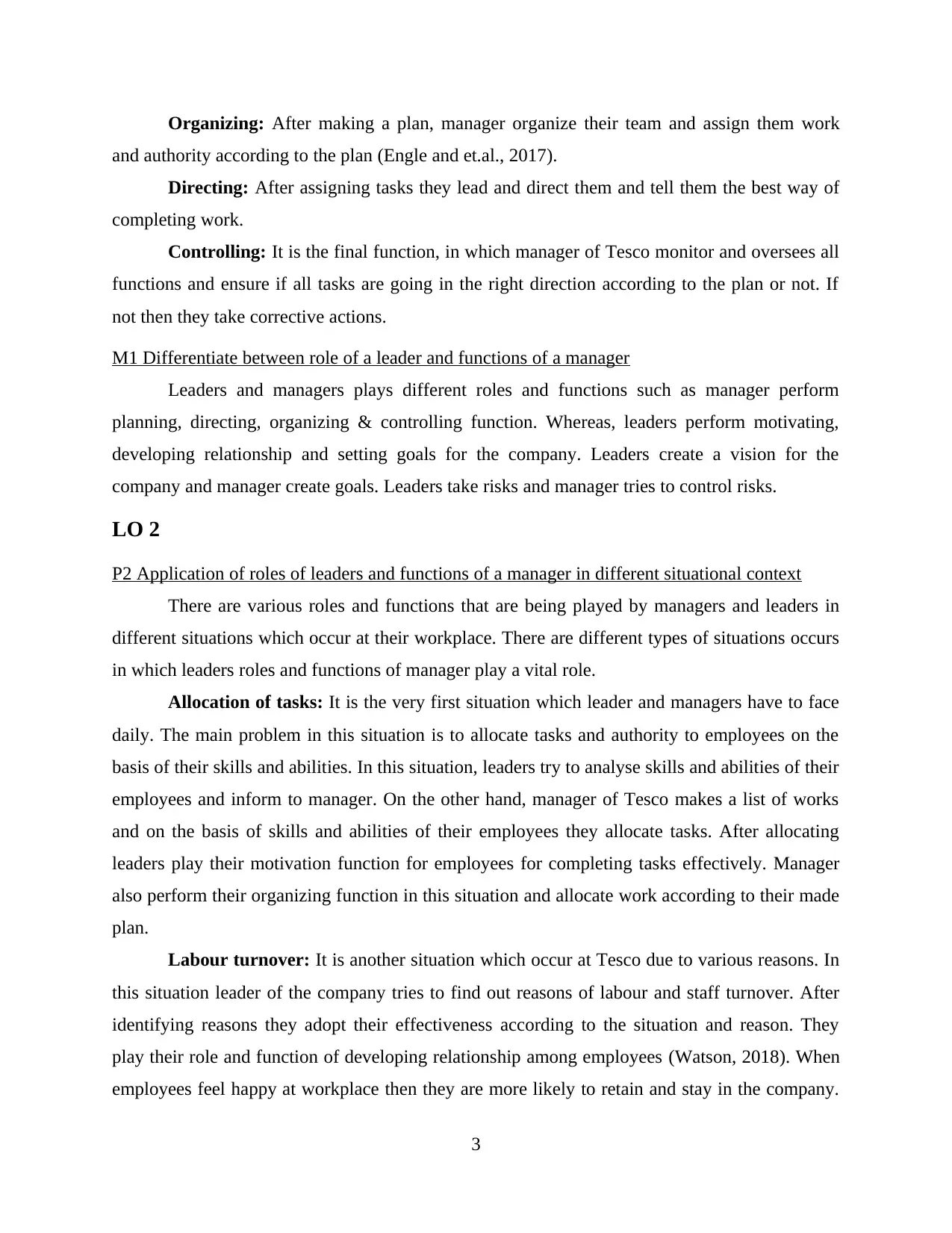
Organizing: After making a plan, manager organize their team and assign them work
and authority according to the plan (Engle and et.al., 2017).
Directing: After assigning tasks they lead and direct them and tell them the best way of
completing work.
Controlling: It is the final function, in which manager of Tesco monitor and oversees all
functions and ensure if all tasks are going in the right direction according to the plan or not. If
not then they take corrective actions.
M1 Differentiate between role of a leader and functions of a manager
Leaders and managers plays different roles and functions such as manager perform
planning, directing, organizing & controlling function. Whereas, leaders perform motivating,
developing relationship and setting goals for the company. Leaders create a vision for the
company and manager create goals. Leaders take risks and manager tries to control risks.
LO 2
P2 Application of roles of leaders and functions of a manager in different situational context
There are various roles and functions that are being played by managers and leaders in
different situations which occur at their workplace. There are different types of situations occurs
in which leaders roles and functions of manager play a vital role.
Allocation of tasks: It is the very first situation which leader and managers have to face
daily. The main problem in this situation is to allocate tasks and authority to employees on the
basis of their skills and abilities. In this situation, leaders try to analyse skills and abilities of their
employees and inform to manager. On the other hand, manager of Tesco makes a list of works
and on the basis of skills and abilities of their employees they allocate tasks. After allocating
leaders play their motivation function for employees for completing tasks effectively. Manager
also perform their organizing function in this situation and allocate work according to their made
plan.
Labour turnover: It is another situation which occur at Tesco due to various reasons. In
this situation leader of the company tries to find out reasons of labour and staff turnover. After
identifying reasons they adopt their effectiveness according to the situation and reason. They
play their role and function of developing relationship among employees (Watson, 2018). When
employees feel happy at workplace then they are more likely to retain and stay in the company.
3
and authority according to the plan (Engle and et.al., 2017).
Directing: After assigning tasks they lead and direct them and tell them the best way of
completing work.
Controlling: It is the final function, in which manager of Tesco monitor and oversees all
functions and ensure if all tasks are going in the right direction according to the plan or not. If
not then they take corrective actions.
M1 Differentiate between role of a leader and functions of a manager
Leaders and managers plays different roles and functions such as manager perform
planning, directing, organizing & controlling function. Whereas, leaders perform motivating,
developing relationship and setting goals for the company. Leaders create a vision for the
company and manager create goals. Leaders take risks and manager tries to control risks.
LO 2
P2 Application of roles of leaders and functions of a manager in different situational context
There are various roles and functions that are being played by managers and leaders in
different situations which occur at their workplace. There are different types of situations occurs
in which leaders roles and functions of manager play a vital role.
Allocation of tasks: It is the very first situation which leader and managers have to face
daily. The main problem in this situation is to allocate tasks and authority to employees on the
basis of their skills and abilities. In this situation, leaders try to analyse skills and abilities of their
employees and inform to manager. On the other hand, manager of Tesco makes a list of works
and on the basis of skills and abilities of their employees they allocate tasks. After allocating
leaders play their motivation function for employees for completing tasks effectively. Manager
also perform their organizing function in this situation and allocate work according to their made
plan.
Labour turnover: It is another situation which occur at Tesco due to various reasons. In
this situation leader of the company tries to find out reasons of labour and staff turnover. After
identifying reasons they adopt their effectiveness according to the situation and reason. They
play their role and function of developing relationship among employees (Watson, 2018). When
employees feel happy at workplace then they are more likely to retain and stay in the company.
3
⊘ This is a preview!⊘
Do you want full access?
Subscribe today to unlock all pages.

Trusted by 1+ million students worldwide
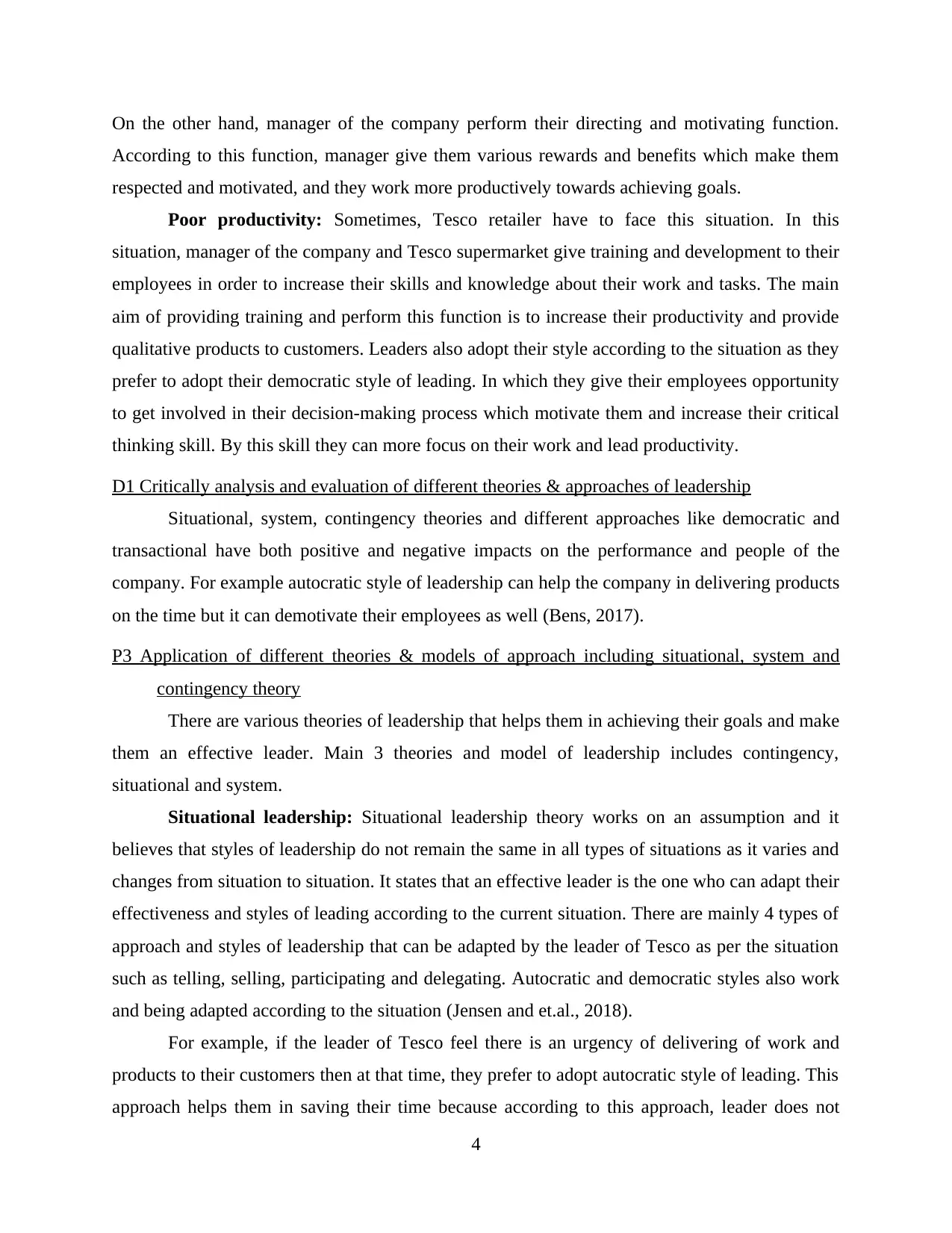
On the other hand, manager of the company perform their directing and motivating function.
According to this function, manager give them various rewards and benefits which make them
respected and motivated, and they work more productively towards achieving goals.
Poor productivity: Sometimes, Tesco retailer have to face this situation. In this
situation, manager of the company and Tesco supermarket give training and development to their
employees in order to increase their skills and knowledge about their work and tasks. The main
aim of providing training and perform this function is to increase their productivity and provide
qualitative products to customers. Leaders also adopt their style according to the situation as they
prefer to adopt their democratic style of leading. In which they give their employees opportunity
to get involved in their decision-making process which motivate them and increase their critical
thinking skill. By this skill they can more focus on their work and lead productivity.
D1 Critically analysis and evaluation of different theories & approaches of leadership
Situational, system, contingency theories and different approaches like democratic and
transactional have both positive and negative impacts on the performance and people of the
company. For example autocratic style of leadership can help the company in delivering products
on the time but it can demotivate their employees as well (Bens, 2017).
P3 Application of different theories & models of approach including situational, system and
contingency theory
There are various theories of leadership that helps them in achieving their goals and make
them an effective leader. Main 3 theories and model of leadership includes contingency,
situational and system.
Situational leadership: Situational leadership theory works on an assumption and it
believes that styles of leadership do not remain the same in all types of situations as it varies and
changes from situation to situation. It states that an effective leader is the one who can adapt their
effectiveness and styles of leading according to the current situation. There are mainly 4 types of
approach and styles of leadership that can be adapted by the leader of Tesco as per the situation
such as telling, selling, participating and delegating. Autocratic and democratic styles also work
and being adapted according to the situation (Jensen and et.al., 2018).
For example, if the leader of Tesco feel there is an urgency of delivering of work and
products to their customers then at that time, they prefer to adopt autocratic style of leading. This
approach helps them in saving their time because according to this approach, leader does not
4
According to this function, manager give them various rewards and benefits which make them
respected and motivated, and they work more productively towards achieving goals.
Poor productivity: Sometimes, Tesco retailer have to face this situation. In this
situation, manager of the company and Tesco supermarket give training and development to their
employees in order to increase their skills and knowledge about their work and tasks. The main
aim of providing training and perform this function is to increase their productivity and provide
qualitative products to customers. Leaders also adopt their style according to the situation as they
prefer to adopt their democratic style of leading. In which they give their employees opportunity
to get involved in their decision-making process which motivate them and increase their critical
thinking skill. By this skill they can more focus on their work and lead productivity.
D1 Critically analysis and evaluation of different theories & approaches of leadership
Situational, system, contingency theories and different approaches like democratic and
transactional have both positive and negative impacts on the performance and people of the
company. For example autocratic style of leadership can help the company in delivering products
on the time but it can demotivate their employees as well (Bens, 2017).
P3 Application of different theories & models of approach including situational, system and
contingency theory
There are various theories of leadership that helps them in achieving their goals and make
them an effective leader. Main 3 theories and model of leadership includes contingency,
situational and system.
Situational leadership: Situational leadership theory works on an assumption and it
believes that styles of leadership do not remain the same in all types of situations as it varies and
changes from situation to situation. It states that an effective leader is the one who can adapt their
effectiveness and styles of leading according to the current situation. There are mainly 4 types of
approach and styles of leadership that can be adapted by the leader of Tesco as per the situation
such as telling, selling, participating and delegating. Autocratic and democratic styles also work
and being adapted according to the situation (Jensen and et.al., 2018).
For example, if the leader of Tesco feel there is an urgency of delivering of work and
products to their customers then at that time, they prefer to adopt autocratic style of leading. This
approach helps them in saving their time because according to this approach, leader does not
4
Paraphrase This Document
Need a fresh take? Get an instant paraphrase of this document with our AI Paraphraser
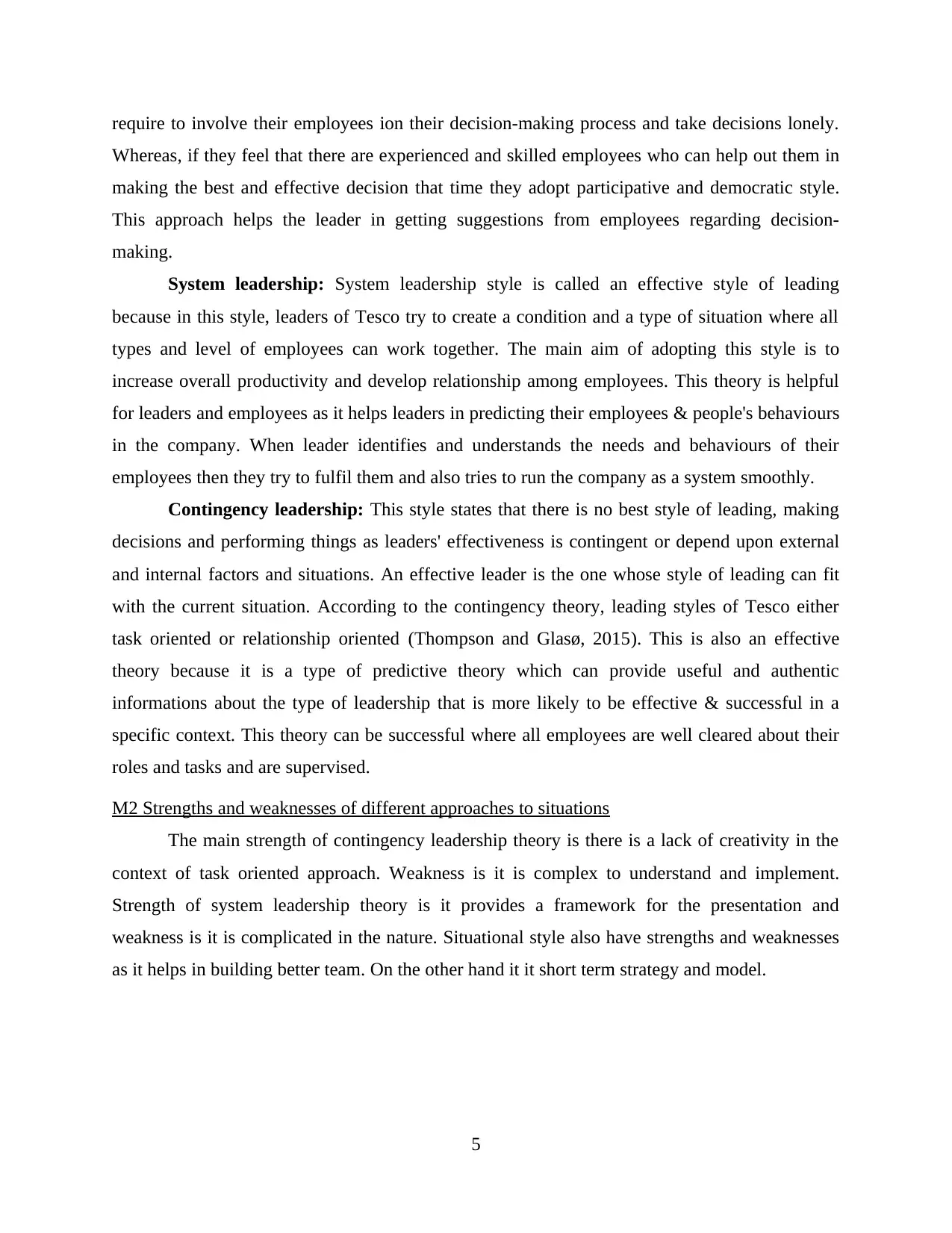
require to involve their employees ion their decision-making process and take decisions lonely.
Whereas, if they feel that there are experienced and skilled employees who can help out them in
making the best and effective decision that time they adopt participative and democratic style.
This approach helps the leader in getting suggestions from employees regarding decision-
making.
System leadership: System leadership style is called an effective style of leading
because in this style, leaders of Tesco try to create a condition and a type of situation where all
types and level of employees can work together. The main aim of adopting this style is to
increase overall productivity and develop relationship among employees. This theory is helpful
for leaders and employees as it helps leaders in predicting their employees & people's behaviours
in the company. When leader identifies and understands the needs and behaviours of their
employees then they try to fulfil them and also tries to run the company as a system smoothly.
Contingency leadership: This style states that there is no best style of leading, making
decisions and performing things as leaders' effectiveness is contingent or depend upon external
and internal factors and situations. An effective leader is the one whose style of leading can fit
with the current situation. According to the contingency theory, leading styles of Tesco either
task oriented or relationship oriented (Thompson and Glasø, 2015). This is also an effective
theory because it is a type of predictive theory which can provide useful and authentic
informations about the type of leadership that is more likely to be effective & successful in a
specific context. This theory can be successful where all employees are well cleared about their
roles and tasks and are supervised.
M2 Strengths and weaknesses of different approaches to situations
The main strength of contingency leadership theory is there is a lack of creativity in the
context of task oriented approach. Weakness is it is complex to understand and implement.
Strength of system leadership theory is it provides a framework for the presentation and
weakness is it is complicated in the nature. Situational style also have strengths and weaknesses
as it helps in building better team. On the other hand it it short term strategy and model.
5
Whereas, if they feel that there are experienced and skilled employees who can help out them in
making the best and effective decision that time they adopt participative and democratic style.
This approach helps the leader in getting suggestions from employees regarding decision-
making.
System leadership: System leadership style is called an effective style of leading
because in this style, leaders of Tesco try to create a condition and a type of situation where all
types and level of employees can work together. The main aim of adopting this style is to
increase overall productivity and develop relationship among employees. This theory is helpful
for leaders and employees as it helps leaders in predicting their employees & people's behaviours
in the company. When leader identifies and understands the needs and behaviours of their
employees then they try to fulfil them and also tries to run the company as a system smoothly.
Contingency leadership: This style states that there is no best style of leading, making
decisions and performing things as leaders' effectiveness is contingent or depend upon external
and internal factors and situations. An effective leader is the one whose style of leading can fit
with the current situation. According to the contingency theory, leading styles of Tesco either
task oriented or relationship oriented (Thompson and Glasø, 2015). This is also an effective
theory because it is a type of predictive theory which can provide useful and authentic
informations about the type of leadership that is more likely to be effective & successful in a
specific context. This theory can be successful where all employees are well cleared about their
roles and tasks and are supervised.
M2 Strengths and weaknesses of different approaches to situations
The main strength of contingency leadership theory is there is a lack of creativity in the
context of task oriented approach. Weakness is it is complex to understand and implement.
Strength of system leadership theory is it provides a framework for the presentation and
weakness is it is complicated in the nature. Situational style also have strengths and weaknesses
as it helps in building better team. On the other hand it it short term strategy and model.
5
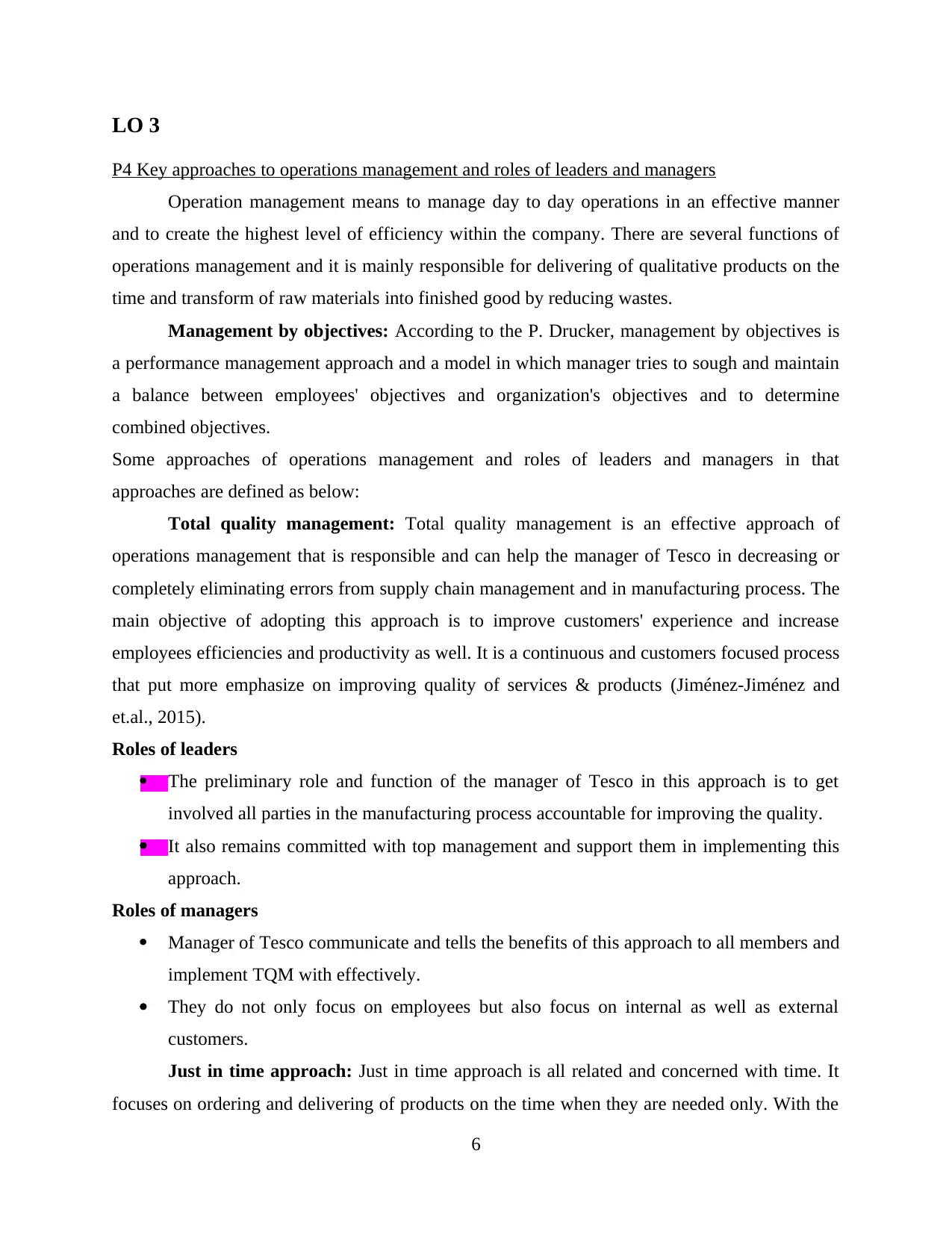
LO 3
P4 Key approaches to operations management and roles of leaders and managers
Operation management means to manage day to day operations in an effective manner
and to create the highest level of efficiency within the company. There are several functions of
operations management and it is mainly responsible for delivering of qualitative products on the
time and transform of raw materials into finished good by reducing wastes.
Management by objectives: According to the P. Drucker, management by objectives is
a performance management approach and a model in which manager tries to sough and maintain
a balance between employees' objectives and organization's objectives and to determine
combined objectives.
Some approaches of operations management and roles of leaders and managers in that
approaches are defined as below:
Total quality management: Total quality management is an effective approach of
operations management that is responsible and can help the manager of Tesco in decreasing or
completely eliminating errors from supply chain management and in manufacturing process. The
main objective of adopting this approach is to improve customers' experience and increase
employees efficiencies and productivity as well. It is a continuous and customers focused process
that put more emphasize on improving quality of services & products (Jiménez-Jiménez and
et.al., 2015).
Roles of leaders
The preliminary role and function of the manager of Tesco in this approach is to get
involved all parties in the manufacturing process accountable for improving the quality.
It also remains committed with top management and support them in implementing this
approach.
Roles of managers
Manager of Tesco communicate and tells the benefits of this approach to all members and
implement TQM with effectively.
They do not only focus on employees but also focus on internal as well as external
customers.
Just in time approach: Just in time approach is all related and concerned with time. It
focuses on ordering and delivering of products on the time when they are needed only. With the
6
P4 Key approaches to operations management and roles of leaders and managers
Operation management means to manage day to day operations in an effective manner
and to create the highest level of efficiency within the company. There are several functions of
operations management and it is mainly responsible for delivering of qualitative products on the
time and transform of raw materials into finished good by reducing wastes.
Management by objectives: According to the P. Drucker, management by objectives is
a performance management approach and a model in which manager tries to sough and maintain
a balance between employees' objectives and organization's objectives and to determine
combined objectives.
Some approaches of operations management and roles of leaders and managers in that
approaches are defined as below:
Total quality management: Total quality management is an effective approach of
operations management that is responsible and can help the manager of Tesco in decreasing or
completely eliminating errors from supply chain management and in manufacturing process. The
main objective of adopting this approach is to improve customers' experience and increase
employees efficiencies and productivity as well. It is a continuous and customers focused process
that put more emphasize on improving quality of services & products (Jiménez-Jiménez and
et.al., 2015).
Roles of leaders
The preliminary role and function of the manager of Tesco in this approach is to get
involved all parties in the manufacturing process accountable for improving the quality.
It also remains committed with top management and support them in implementing this
approach.
Roles of managers
Manager of Tesco communicate and tells the benefits of this approach to all members and
implement TQM with effectively.
They do not only focus on employees but also focus on internal as well as external
customers.
Just in time approach: Just in time approach is all related and concerned with time. It
focuses on ordering and delivering of products on the time when they are needed only. With the
6
⊘ This is a preview!⊘
Do you want full access?
Subscribe today to unlock all pages.

Trusted by 1+ million students worldwide
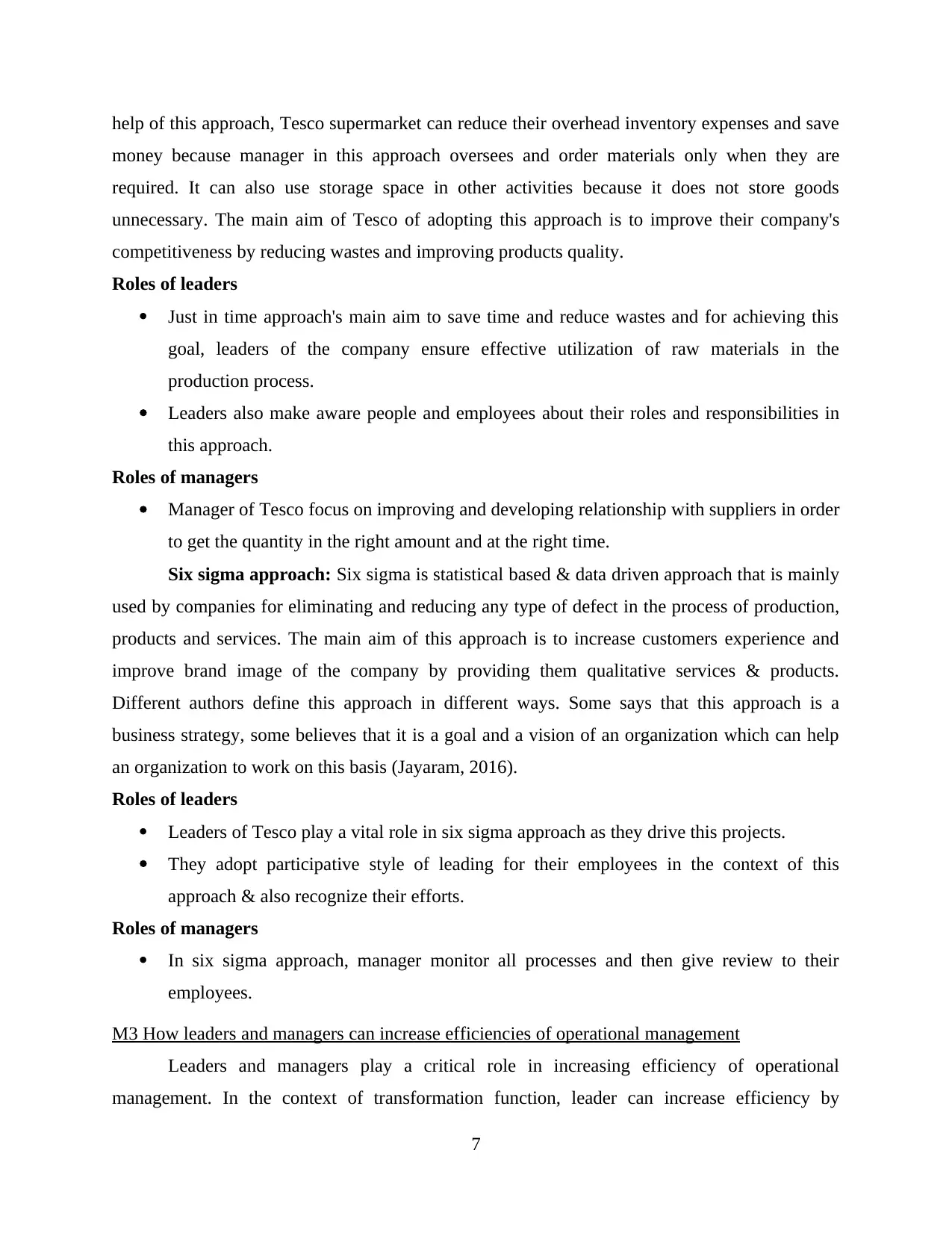
help of this approach, Tesco supermarket can reduce their overhead inventory expenses and save
money because manager in this approach oversees and order materials only when they are
required. It can also use storage space in other activities because it does not store goods
unnecessary. The main aim of Tesco of adopting this approach is to improve their company's
competitiveness by reducing wastes and improving products quality.
Roles of leaders
Just in time approach's main aim to save time and reduce wastes and for achieving this
goal, leaders of the company ensure effective utilization of raw materials in the
production process.
Leaders also make aware people and employees about their roles and responsibilities in
this approach.
Roles of managers
Manager of Tesco focus on improving and developing relationship with suppliers in order
to get the quantity in the right amount and at the right time.
Six sigma approach: Six sigma is statistical based & data driven approach that is mainly
used by companies for eliminating and reducing any type of defect in the process of production,
products and services. The main aim of this approach is to increase customers experience and
improve brand image of the company by providing them qualitative services & products.
Different authors define this approach in different ways. Some says that this approach is a
business strategy, some believes that it is a goal and a vision of an organization which can help
an organization to work on this basis (Jayaram, 2016).
Roles of leaders
Leaders of Tesco play a vital role in six sigma approach as they drive this projects.
They adopt participative style of leading for their employees in the context of this
approach & also recognize their efforts.
Roles of managers
In six sigma approach, manager monitor all processes and then give review to their
employees.
M3 How leaders and managers can increase efficiencies of operational management
Leaders and managers play a critical role in increasing efficiency of operational
management. In the context of transformation function, leader can increase efficiency by
7
money because manager in this approach oversees and order materials only when they are
required. It can also use storage space in other activities because it does not store goods
unnecessary. The main aim of Tesco of adopting this approach is to improve their company's
competitiveness by reducing wastes and improving products quality.
Roles of leaders
Just in time approach's main aim to save time and reduce wastes and for achieving this
goal, leaders of the company ensure effective utilization of raw materials in the
production process.
Leaders also make aware people and employees about their roles and responsibilities in
this approach.
Roles of managers
Manager of Tesco focus on improving and developing relationship with suppliers in order
to get the quantity in the right amount and at the right time.
Six sigma approach: Six sigma is statistical based & data driven approach that is mainly
used by companies for eliminating and reducing any type of defect in the process of production,
products and services. The main aim of this approach is to increase customers experience and
improve brand image of the company by providing them qualitative services & products.
Different authors define this approach in different ways. Some says that this approach is a
business strategy, some believes that it is a goal and a vision of an organization which can help
an organization to work on this basis (Jayaram, 2016).
Roles of leaders
Leaders of Tesco play a vital role in six sigma approach as they drive this projects.
They adopt participative style of leading for their employees in the context of this
approach & also recognize their efforts.
Roles of managers
In six sigma approach, manager monitor all processes and then give review to their
employees.
M3 How leaders and managers can increase efficiencies of operational management
Leaders and managers play a critical role in increasing efficiency of operational
management. In the context of transformation function, leader can increase efficiency by
7
Paraphrase This Document
Need a fresh take? Get an instant paraphrase of this document with our AI Paraphraser
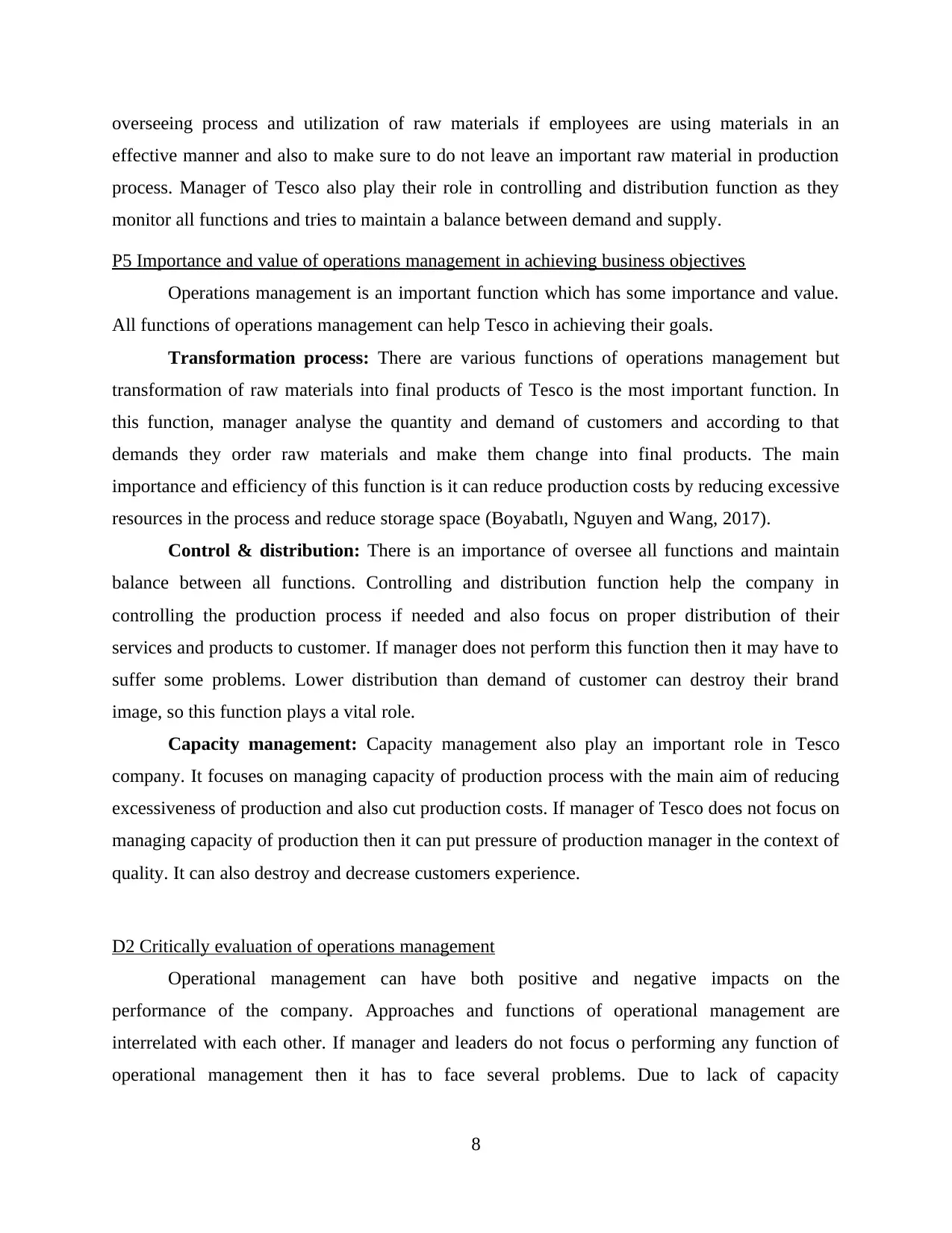
overseeing process and utilization of raw materials if employees are using materials in an
effective manner and also to make sure to do not leave an important raw material in production
process. Manager of Tesco also play their role in controlling and distribution function as they
monitor all functions and tries to maintain a balance between demand and supply.
P5 Importance and value of operations management in achieving business objectives
Operations management is an important function which has some importance and value.
All functions of operations management can help Tesco in achieving their goals.
Transformation process: There are various functions of operations management but
transformation of raw materials into final products of Tesco is the most important function. In
this function, manager analyse the quantity and demand of customers and according to that
demands they order raw materials and make them change into final products. The main
importance and efficiency of this function is it can reduce production costs by reducing excessive
resources in the process and reduce storage space (Boyabatlı, Nguyen and Wang, 2017).
Control & distribution: There is an importance of oversee all functions and maintain
balance between all functions. Controlling and distribution function help the company in
controlling the production process if needed and also focus on proper distribution of their
services and products to customer. If manager does not perform this function then it may have to
suffer some problems. Lower distribution than demand of customer can destroy their brand
image, so this function plays a vital role.
Capacity management: Capacity management also play an important role in Tesco
company. It focuses on managing capacity of production process with the main aim of reducing
excessiveness of production and also cut production costs. If manager of Tesco does not focus on
managing capacity of production then it can put pressure of production manager in the context of
quality. It can also destroy and decrease customers experience.
D2 Critically evaluation of operations management
Operational management can have both positive and negative impacts on the
performance of the company. Approaches and functions of operational management are
interrelated with each other. If manager and leaders do not focus o performing any function of
operational management then it has to face several problems. Due to lack of capacity
8
effective manner and also to make sure to do not leave an important raw material in production
process. Manager of Tesco also play their role in controlling and distribution function as they
monitor all functions and tries to maintain a balance between demand and supply.
P5 Importance and value of operations management in achieving business objectives
Operations management is an important function which has some importance and value.
All functions of operations management can help Tesco in achieving their goals.
Transformation process: There are various functions of operations management but
transformation of raw materials into final products of Tesco is the most important function. In
this function, manager analyse the quantity and demand of customers and according to that
demands they order raw materials and make them change into final products. The main
importance and efficiency of this function is it can reduce production costs by reducing excessive
resources in the process and reduce storage space (Boyabatlı, Nguyen and Wang, 2017).
Control & distribution: There is an importance of oversee all functions and maintain
balance between all functions. Controlling and distribution function help the company in
controlling the production process if needed and also focus on proper distribution of their
services and products to customer. If manager does not perform this function then it may have to
suffer some problems. Lower distribution than demand of customer can destroy their brand
image, so this function plays a vital role.
Capacity management: Capacity management also play an important role in Tesco
company. It focuses on managing capacity of production process with the main aim of reducing
excessiveness of production and also cut production costs. If manager of Tesco does not focus on
managing capacity of production then it can put pressure of production manager in the context of
quality. It can also destroy and decrease customers experience.
D2 Critically evaluation of operations management
Operational management can have both positive and negative impacts on the
performance of the company. Approaches and functions of operational management are
interrelated with each other. If manager and leaders do not focus o performing any function of
operational management then it has to face several problems. Due to lack of capacity
8
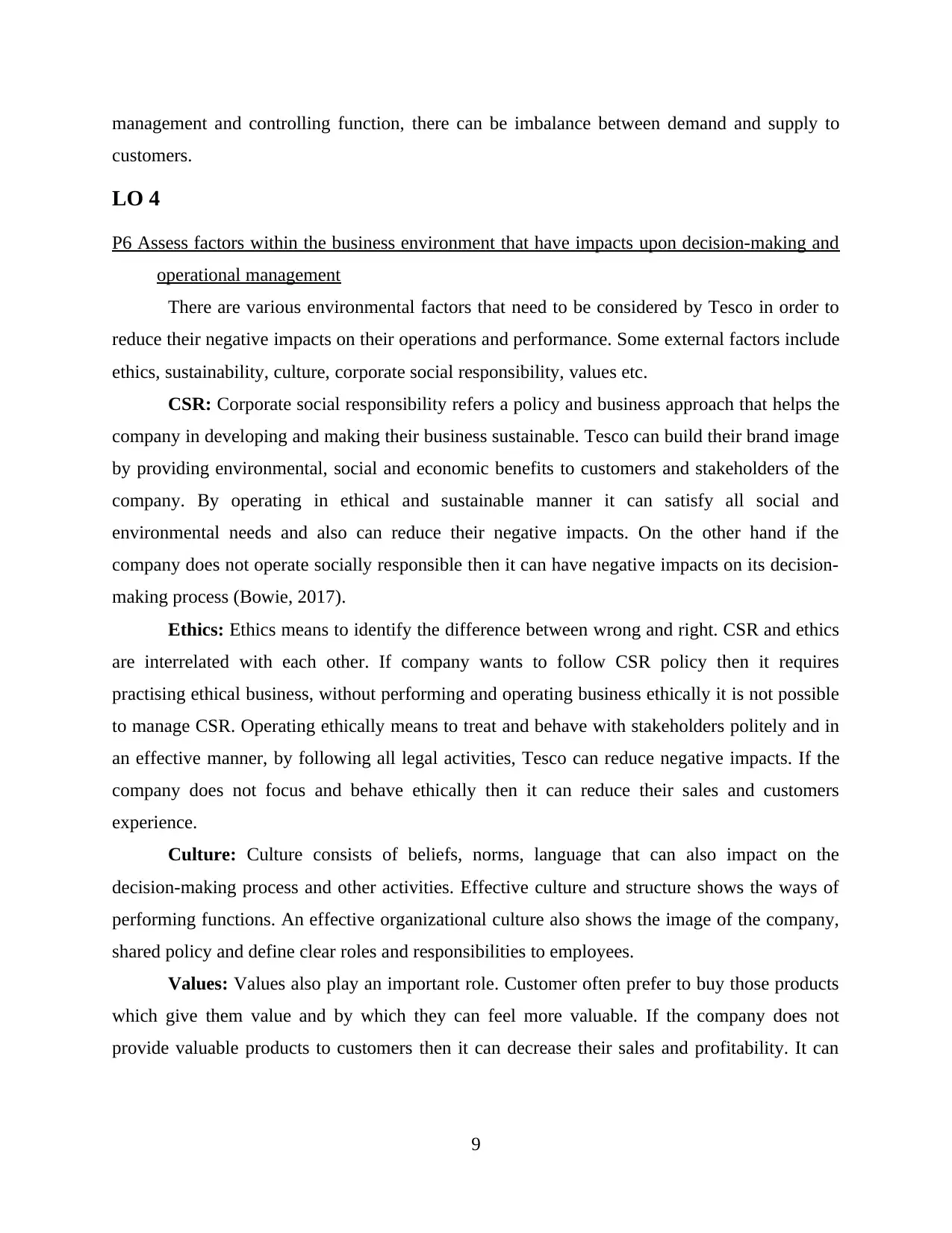
management and controlling function, there can be imbalance between demand and supply to
customers.
LO 4
P6 Assess factors within the business environment that have impacts upon decision-making and
operational management
There are various environmental factors that need to be considered by Tesco in order to
reduce their negative impacts on their operations and performance. Some external factors include
ethics, sustainability, culture, corporate social responsibility, values etc.
CSR: Corporate social responsibility refers a policy and business approach that helps the
company in developing and making their business sustainable. Tesco can build their brand image
by providing environmental, social and economic benefits to customers and stakeholders of the
company. By operating in ethical and sustainable manner it can satisfy all social and
environmental needs and also can reduce their negative impacts. On the other hand if the
company does not operate socially responsible then it can have negative impacts on its decision-
making process (Bowie, 2017).
Ethics: Ethics means to identify the difference between wrong and right. CSR and ethics
are interrelated with each other. If company wants to follow CSR policy then it requires
practising ethical business, without performing and operating business ethically it is not possible
to manage CSR. Operating ethically means to treat and behave with stakeholders politely and in
an effective manner, by following all legal activities, Tesco can reduce negative impacts. If the
company does not focus and behave ethically then it can reduce their sales and customers
experience.
Culture: Culture consists of beliefs, norms, language that can also impact on the
decision-making process and other activities. Effective culture and structure shows the ways of
performing functions. An effective organizational culture also shows the image of the company,
shared policy and define clear roles and responsibilities to employees.
Values: Values also play an important role. Customer often prefer to buy those products
which give them value and by which they can feel more valuable. If the company does not
provide valuable products to customers then it can decrease their sales and profitability. It can
9
customers.
LO 4
P6 Assess factors within the business environment that have impacts upon decision-making and
operational management
There are various environmental factors that need to be considered by Tesco in order to
reduce their negative impacts on their operations and performance. Some external factors include
ethics, sustainability, culture, corporate social responsibility, values etc.
CSR: Corporate social responsibility refers a policy and business approach that helps the
company in developing and making their business sustainable. Tesco can build their brand image
by providing environmental, social and economic benefits to customers and stakeholders of the
company. By operating in ethical and sustainable manner it can satisfy all social and
environmental needs and also can reduce their negative impacts. On the other hand if the
company does not operate socially responsible then it can have negative impacts on its decision-
making process (Bowie, 2017).
Ethics: Ethics means to identify the difference between wrong and right. CSR and ethics
are interrelated with each other. If company wants to follow CSR policy then it requires
practising ethical business, without performing and operating business ethically it is not possible
to manage CSR. Operating ethically means to treat and behave with stakeholders politely and in
an effective manner, by following all legal activities, Tesco can reduce negative impacts. If the
company does not focus and behave ethically then it can reduce their sales and customers
experience.
Culture: Culture consists of beliefs, norms, language that can also impact on the
decision-making process and other activities. Effective culture and structure shows the ways of
performing functions. An effective organizational culture also shows the image of the company,
shared policy and define clear roles and responsibilities to employees.
Values: Values also play an important role. Customer often prefer to buy those products
which give them value and by which they can feel more valuable. If the company does not
provide valuable products to customers then it can decrease their sales and profitability. It can
9
⊘ This is a preview!⊘
Do you want full access?
Subscribe today to unlock all pages.

Trusted by 1+ million students worldwide
1 out of 15
Related Documents
Your All-in-One AI-Powered Toolkit for Academic Success.
+13062052269
info@desklib.com
Available 24*7 on WhatsApp / Email
![[object Object]](/_next/static/media/star-bottom.7253800d.svg)
Unlock your academic potential
Copyright © 2020–2025 A2Z Services. All Rights Reserved. Developed and managed by ZUCOL.





